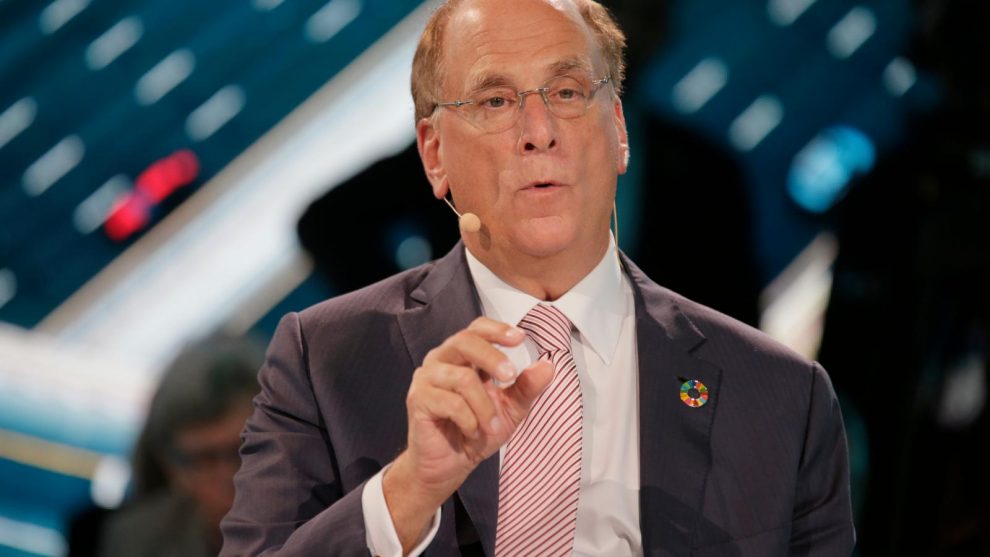The retirement savings and investment accounts of millions of Americans are being used to pressure corporate Americans into adopting the left’s climate agenda and divisive racial politics.
Blackrock, the world’s largest asset manager, has been moving steadily leftward for years and has been putting pressure on public companies to comply with a set of “principles” that read like they were written by Green New Deal and Black Lives Matter activists.
In his annual letter to chief executives, BlackRock Chairman and CEO Larry Fink wrote that “climate change has become a defining factor in companies’ long-term prospects … But awareness is rapidly changing, and I believe we are on the edge of a fundamental reshaping of finance.”
In a “stewardship expectations” report released last week, Blackrock essentially doubled-down on its woke capitalism pressure campaign, saying it would increase the pressure it puts on companies on environmental and racial issues.
In the report, Blackrock issued the order to U.S. companies to disclose the racial, ethnic, and gender makeup of their employees as well as measures they’re taking to advance “diversity, equity, and inclusion.”
“We are raising our expectations, in the context of regional norms, on board and workforce ethnic and gender diversity,” Blackrock said.
Blackrock, which controls $7.8 trillion of assets, holds hundreds of meetings with corporate leaders in which executives are grilled on how they are complying with the asset manager’s “diversity, equity, and inclusion” agenda. From the 2020 stewardship report:
This year, we held 750 engagements with companies on topics related to HCM [human capital management], an increase of 187% from the same period a year before. In our engagements, we seek to understand how a company’s board and management considers issues such as inclusion and diversity, employee development and retention, labor practices, safe working conditions, customer welfare and satisfaction, and community relations.
It also pushes its left-wing climate change agenda in high-level meetings, voting against non-compliant boards, and letting laggards know they are “on watch.”
In 2020, we identified 244 companies that were making insufficient progress integrating climate risk into their business models or disclosures. Of these companies, we took voting action against 53, or 22%. We have put the remaining 191 companies “on watch.” Those that do not make significant progress risk voting action against management in 2021.
This year, we had more than 1,200 engagements with companies on environmental topics (including climate risk), nearly four times the number in the prior year. These engagements spanned topics including board oversight of climate risk management, adaptation strategies for the transition to a low-carbon economy, climate-related disclosure frameworks, environmental impact management, and operational sustainability (e.g., waste, water, energy use and efficiency, packaging, product life-cycle management, supply chain-related environmental impacts, and deforestation risks).
“Where we believe companies are not moving with sufficient speed and urgency, our most frequent course of action will be to hold directors accountable by voting against their re-election,” Blackrock wrote in its 2021 Stewardship Expectations report.
When Blackrock speaks, companies tend to listen. In its Expectations report, Blackrock even brags about how it has pressured boards of companies into adopting racial quotas: “41% of companies where we voted against directors for diversity reasons in 2019 increased their board diversity in the following year.”
Blackrock is also promising to monitor the political activities of public companies to make sure they are not supporting conservative political positions on climate regulation or race-based policies.
We will now seek confirmation from companies, through engagement or disclosure, that their corporate political activities are consistent with their public statements on material and strategic policy issues. Moreover, we expect companies to monitor the positions taken by trade associations of which they are active members on such issues for consistency on major policy positions and to provide an explanation where inconsistencies exist.
Some of its more recent pressure campaigns:
Supporting shareholder proposals to force an Australian energy company to “review advocacy activities undertaken by its industry associations related to economic stimulus measures in response to COVID-19 restrictions, and to suspend membership in associations whose activities and lobbying are not in line with the company’s commitment to the Paris Agreement.”
Supporting shareholder proposals that would force “disclosure on a potential gender and ethnicity pay gap” from U.S. tech giant Oracle.
Supporting a shareholder proposal seeking to force Cintas Corporation, a U.S.-based company that provides specialized corporate products and services, to issue a report on its political contributions. The goal of such proposals is frequently to pressure companies out of supporting conservative causes.
Not surprisingly, Blackrock chief Fink was a major backer of Joe Biden’s campaign for the White House. And Blackrock is sending people from its offices into the administration.
The New York Post reports:
Forget “Government Sachs” — it’s BlackRock that’s shaping up to become Wall Street’s new elephant inside the White House.
President-elect Joe Biden is raising eyebrows with chatter that he’s poised to name two executives from BlackRock — the asset-management colossus headed by billionaire Larry Fink, with more than $7 trillion in holdings — for top posts on his economic team.
It has been many decades since a financial company sought to so openly influence American policy and control corporate decision making in the way Blackrock has. For the most part, Americans rejected the idea that the likes of John Pierpont Morgan or the Rockerfeller’s should wield tremendous influence over business, society, and government. We tend to prefer democratic to plutocratic rule, to have environmental and civil rights rules established through the democratic process rather than emerge from behind the closed doors of financiers.
The new Woke Capitalism is an affront to that tradition. And given how close the Blackrock is to the incoming administration, it is unlikely to meet much resistance from the White House over the next few years.
Story cited here.
























